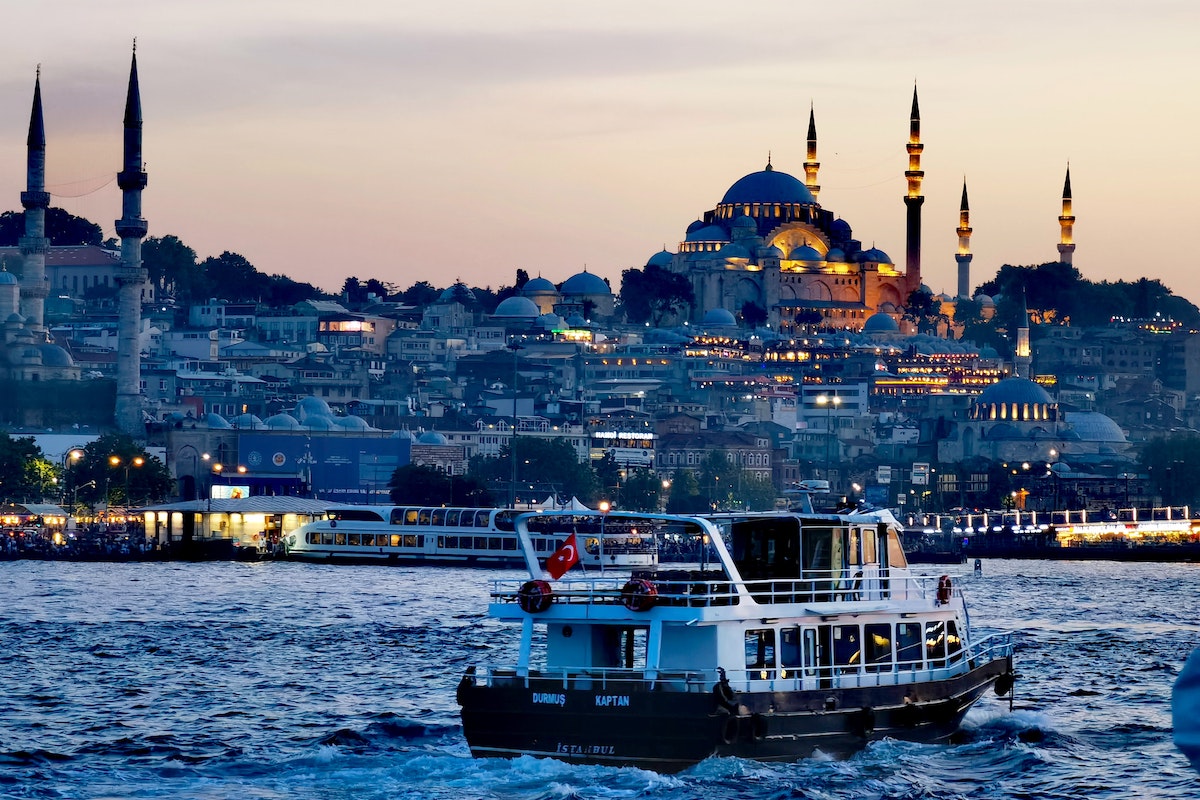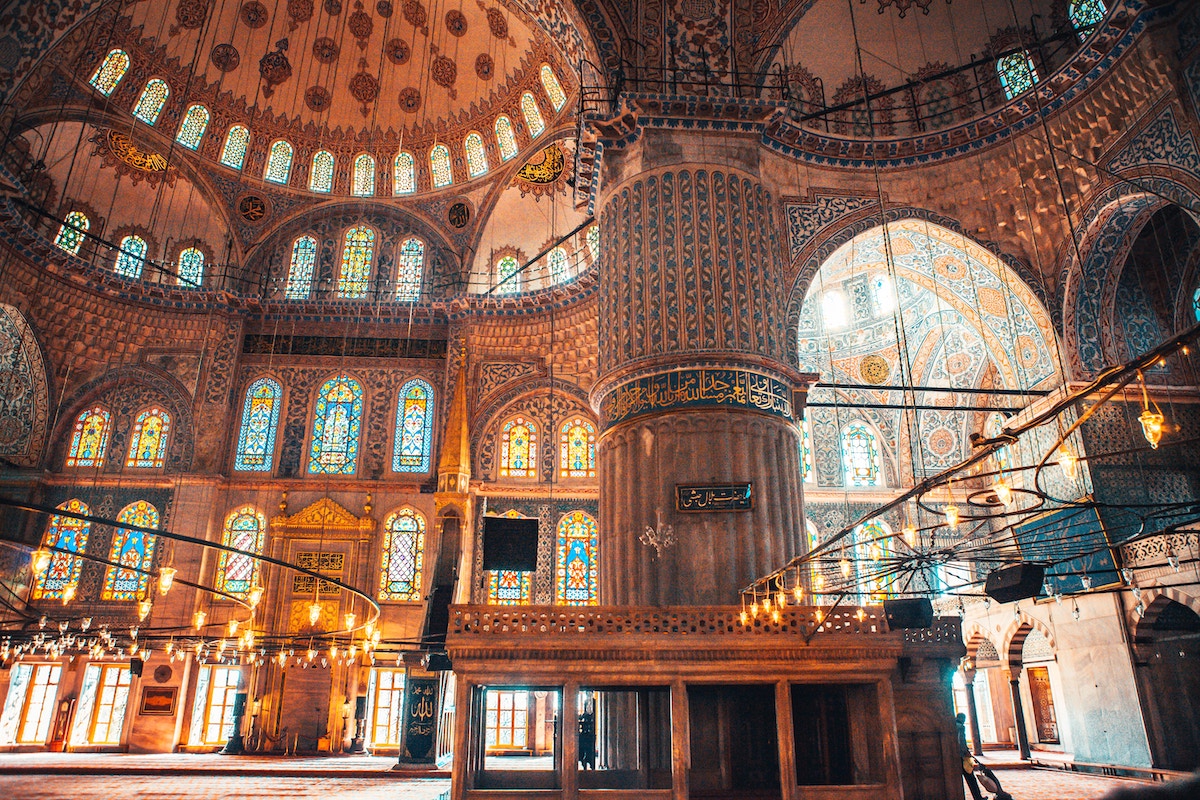
That Which Binds Us: Finding Myself in Istanbul
By: Connie Golding
Skip to Section
Obviously, I did not do all my homework before my most recent trip to Istanbul. Upon our arrival, we found out that it was the first day of Ramadan. There were makeshift bazaars and picnic areas set up for families, and visitors were flocking to the city from all over the world to be part of the celebration.
My mother was my travel companion, and had a desire to go out and watch the families break their fast at the park by our hotel. So on our last night in Istanbul, we went to the Hippodrome shortly before sunset. We purchased a drink and some street food, and sat with our backs to the wall of the Blue Mosque, waiting for the call to prayer. There were thousands of people, like families, who had camped out all day to get a spot for when they were finally able to share a meal together.

Photo by Raimond Klavins on Unsplash
Mom and I took some small bites of our food, then stopped. Being there, seeing all the families, being part of that sense of community halted us. We, too, would wait for the sun to set to enjoy our meal. While we sat and waited, I fiddled with my camera. I saw a young girl running back and forth. She looked at me, and I smiled. As children do, she ran away squealing, but soon her curiosity overtook her and she came running back toward me. I glanced around, and found her mother eyeing me—not with hostility, but with speculation. She was Muslim, her head covered in a beautiful brown scarf. A small bundle of food sat on the ground next to her. I turned my attention back to the child, who was eyeing my camera. She started speaking quickly in a language I did not understand, but pointed to my camera. I understood, turned it on, and took a photo of her. I looked up at her mother to make sure this was ok, and she nodded.
Soon, the little girl was grabbing at my camera. I took another photo and immediately she struck a pose, her hands on her hips and her head cocked to the side, a large bright smile on her face.
I kneeled down to show her the image I just took. She grabbed the camera from my hand and tried to take a photo. But this is not a simple point and shoot camera—you have to hold down the photo button, wait for it to focus, and then wait again for the camera to actually take the picture. The little girl did not understand; she put her finger on top of the button, and I put mine on top of hers. I held her finger down, and the camera went off. Once she realized how it worked. She started to put the lens up to her eye to take a photo. I looked at her mom, who was trying to call her back. I turned the camera off, then walked her over to her mother. At this point, many families were staring at the spectacle, laughing at the little girl trying to take photos of her eyeball while the camera was turned off.
I kneeled down next to the mother, who began to speak to me in her native language. I looked at her quizzically. I asked if she spoke English. She said “a little,” while holding up her hand and making the universal sign for small with her thumb and pointer finger. She pointed to her daughter, who was busy playing with the turned off camera, and said, “She is Miriam”.
I smiled, held out my hand to her and said, “I am Connie.”
She shook my hand and asked, “You are Italian, French?” to which I answered “American.” It was nearly imperceptible, the shift in her expression. She said, “We are Iraqi, from Baghdad.”
I didn’t know how to respond. Our mainstream news media painted Baghdad as a dangerous place and I had never met anyone—who was not a Washington diplomat—from Iraq. I looked her in the eyes and said, “It is nice to meet you,” and smiled. She smiled in return.
I took a piece of paper and pen from my bag and held it out to her. “If it is ok, you can give me your email and I will send you the photos I took of Miriam.” She understood me, and took the pen and paper. She wrote out her email address, and because she was not certain I understood it, I rewrote it out as well. She did not immediately give me back my pen and paper. Instead, underneath her email she wrote the number 18. She turned to me and said, in broken English, “Miriam is from Allah. I prayed for 18 years until I was given Miriam, and she is my only child.” I looked at her, astonished. I then looked at Miriam, still busy trying to get the camera to work. I returned the mother’s gaze, her smile having grown knowing that I understood her.
“She is a beautiful gift from Allah,” I said.
At this point, Miriam was angry that the camera was not working. I pointed to the camera, then laid my head on my hands, as if to mimic going to sleep. I said, “It is the camera’s bedtime.” Her mother translated, but that didn’t stop Miriam. She tried for a few more minutes, until I was able to take the camera back and return to sit with my own mother. In my play with Miriam, I had missed the call to prayer; everyone was eating.
Eventually, Mom and I got up, offering our seats to a family who was looking for a place to sit and dine. They protested us moving, but one of their younger daughters spoke English and I explained we had come to be part of their beautiful community, and that they should have our seat so they could enjoy their family and dinner. While we were leaving, the girl thanked us and said, “May Allah go with you.”
We wade past Miriam, who was now sitting with her mother and eating a corn cob. Neither of them saw us leave, but that is ok. That night, I understood something so much larger than myself, community, or family. I came to realize and respect the vast beauty of Islamic culture. All the people gathered at the Hippodrome and Sultanahmet Park may have been there with their families, but they shared their food with the people sitting next to them. They took turns watching children who were running and playing as parents broke their fast. Not all of them were Turkish; there were people from all over the world, and yet that meant nothing that night. Their differences were not as great as the beautiful religion and community that bound them.
Oftentimes, Westerners, especially Americans, become brainwashed by the media. The negativity they read and see on TV about Muslim nations makes them believe that all of Islam must act the same way. This generalization is not only terribly wrong, but it also is a reason there is so much hatred and hostility in the world. While in Istanbul, I was surrounded by Turks, Iranians, Pakistanis, Iraqis, and just about every Muslim nation you could imagine. I never once felt unsafe. People were friendly, they smiled, and they offered help if we needed it. Yes, some of the salesmen were pushy, but never rude. They all got along with one another because of this great binding religion.
And that got me thinking. I may not share the same beliefs that they do, but that doesn’t mean I am not like them. I have a strong sense of family, and would do anything for my parents or brothers; they do as well. I would stop and help a stranger if I had the means to do so, as they did for me. If I was out with a group of people and a child needed help while the parent was away, I would offer aid and entertainment until the parent returned, as I witnessed countless people doing that night. Most importantly, I am a member of the human race, just like them.
So I propose this to everyone who reads this article: go on a trip somewhere that’s completely out of your comfort zone. Only like to travel to Europe? Then go to Turkey, or Asia! While there, do the touristy things, but also make sure to take in the local culture and interact with the locals. The experience will change your life, I promise. And if only 100 people have an experience and moment of clarity like I did with Miriam and her mother, the world will become a better place. We will all begin to realize that which binds us is so much greater than what differentiates us.
Photos from Connie’s trip to Prague and Istanbul can be found here!
Featured image via Unsplash.
Information published on this website and across our networks can change over time. Stories and recommendations reflect the subjective opinions of our writers. You should consult multiple sources to ensure you have the most current, safe, and correct details for your own research and plans.
Frayed Passport is a participant in the Amazon Associates Program, an affiliate advertising program designed to provide a means for sites to earn advertising fees by advertising and linking to Amazon.com. We also may share links to other affiliates and sponsors in articles across our website.




